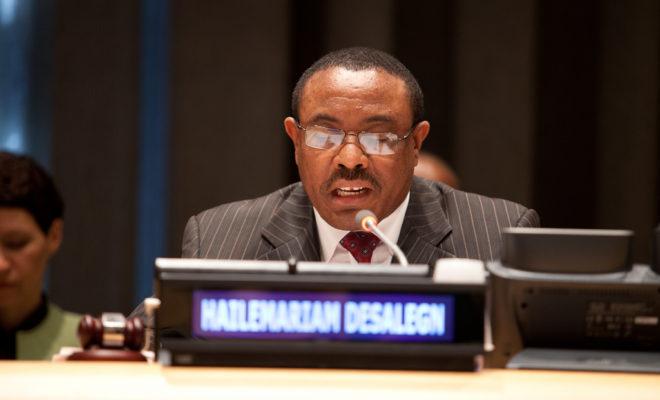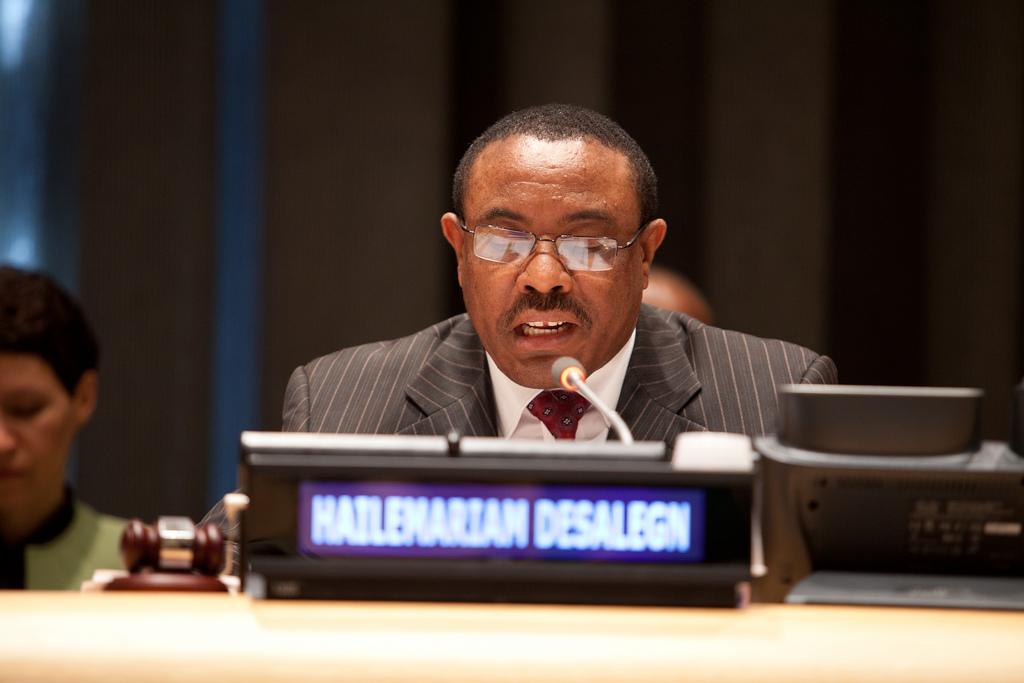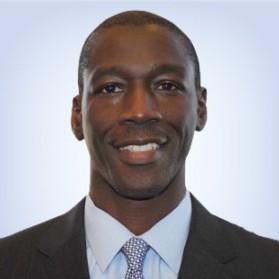Ethiopia: The relentless protests that forced the Prime Minister to resign

The stepping down of Hailemariam Desalegn will not satisfy Ethiopia’s protesters. But it is a start.

Hailemariam Desalegn, in power since 2012, has said he will remain a caretaker prime minister until his successor is picked. Credit: United Nations/Bo Li.
Hailemariam Desalegn has announced his resignation as Ethiopia’s Prime Minister and chair of the ruling Ethiopian People’s Revolutionary Democratic Front (EPRDF).
According to some analysts, the prime minister since 2012 was expected to step down at the EPRDF congress scheduled for later this year, but today’s move came as a surprise.
Desalegn said he would formally step down once a successor is chosen and claimed his departure was part of the government’s attempts to change how it operates. “I see my resignation as vital in the bid to carry out reforms that would lead to sustainable peace and democracy,” he said in a televised address.
The government has faced a crisis of legitimacy in recent years amidst huge protests across much of the country, particularly by members of the populous Oromo and Amhara ethnic groups. Hundreds of people have been killed in resulting clashes with security forces.
Desalegn’s resignation can be seen as a response to the fact these protests have continued despite brutal crackdowns and gestures of reform. As analyst Mohammed Ademo says: “Make no mistake. This momentous transformation isn’t a favor from a benevolent vanguard party. It’s the cumulative outcome of years of relentless struggle by democracy activists and opposition. Many died fighting to see this day.”
Oromo and Amhara protests
Ademo says Desalegn’s replacement is widely expected to come from the Oromo party in the ruling coalition. Protests in the Oromiya have been particularly sustained and this week saw a concerted three-day strike across the region. Enormous numbers blockaded roads and marches on the streets of towns and cities. An Oromo prime minister would not necessarily mean the regime would change it how it governs, but it would be a symbolic victory for the protests in that region.
However, as speculation grows about what happens next, protests in Ethiopia’s northern Amhara region – although generally lesser covered – should not be forgotten. Just last month, demonstrations flared up in Amhara too, resulting in bloody clashes and several deaths.
These weeklong events were triggered in the town of Woldiya when people taking part in a popular religious festival chanted anti-government slogans. Security forces responded violently, leading to the deaths of at least six civilians and one security agent. Angry at this bloodshed, protests then spread to the nearby cities of Kobo and Mersa where government offices and private property were attacked, leading to millions of dollars of damage. At least eight more people were killed in the resulting crackdown.
Grievances and triggers
These recent anti-government demonstrations are the continuation of those that emerged in late-2015. At that time, members of the Oromo and then Amhara – Ethiopia’s two largest ethnic groups, who together make up about two-thirds of the population – began protesting in huge numbers.
The grievances that triggered those protests were not resolved, but temporarily suppressed through force and the imposition of a state of emergency from October 2016 to August 2017.
The Oromo protests have deep roots and encompass widespread disaffection with the government regarding human rights abuses and lack of freedoms, but they were initially triggered by an urban development plan in the capital. Addis Ababa is located within the Oromiya region and activists complained that the proposed expansion would have seen it swallow up Oromia land and towns.
The Amhara’s reasons for protesting have been similarly manifold. They have demanded greater respect for human rights and democracy. They have called for more economic investment in the Amhara region to create employment and spur development. And they have expressed anger at an unfair political economy that disproportionately benefits supporters of the regime.
However, one of key triggers of the Amhara’s protests has been the disputed territory of Wolqaite. Activists claim that this large agricultural district was annexed by neighbouring Tigray regional state despite the fact its residents largely identify as Amhara, and a committee was established to campaign for its return. The government’s decision in 2016 to detain this group’s leaders using Ethiopia’s notorious anti-terrorism law was one of the main triggers of the widespread protests that followed.
It remains to be seen how many of these protesters demands will, and can, be met by a new EPRDF prime minister.
Infighting in government
As well as on the streets, growing discontent with the ruling class has also manifested in the corridors of power. In office since 1991, the ruling coalition known as the Ethiopian People’s Revolutionary Democratic Front (EPRDF) is composed of four ethno-nationalist parties. This includes the Amhara National Democratic Movement (ANDM), the Oromo Peoples’ Democratic Organisation (OPDO), and the Southern Ethiopian People’s Democratic Movement (SEPDM).
However, by far the most senior and strongest party within the coalition is the Tigrayan People’s Liberation Front (TPLF). Representing an estimated 6% of the population, the TPLF oversaw the formation of the other three parties in government and handpicked their leaders.
Over the years, the TPLF has taken advantage of its dominance to favour its political base. Today, Tigreans dominate key political and economic positions, including in the army, security establishment, key federal ministries, and state-owned corporations such as Ethiopian Airlines and Ethio Telecom.
The government’s junior parties have typically been acquiescent. But with growing pressure from their constituencies, the OPDO, and to a lesser extent ANDM, have become more assertive. They have demanded less interference from the TPLF in their regional affairs and expanded political and economic roles at the federal level. At times, decisions and policy directions provided by federal authorities have been over turned by regional authorities, and vice versa.
Some are now suggesting the new prime minister will be from the OPDO. While this would be symbolically meaningful, it is too early to say how significant it would be in terms of governance. TPLF loyalists would still hold key positions and it is notable that outgoing Desalegn is not from the TPFL either, but the SEPDM. He was chosen by the former PM Meles Zenawi to be his successor and was viewed by many as a puppet of the TPLF.
Ethiopia after Desalegn
Years of unaccountability, the collapse of rule of law, and the ethnicisation of the country’s politics have pushed Ethiopia to tipping point. Injustice, repression and lack of democracy have instilled a sense of despondency, particularly among Ethiopia’s youth. This has driven many to view protests as the only viable means of bringing about meaningful political change.
As these sustained mobilisations have continued, the government has been forced to offer ever greater signs that it is willing to reform, most notably through Desalegn’s resignation as well as the recent release hundreds of political prisoners. But unless this leads to real steps to institute rule of law, redefine the political economy, and promote a fairer distribution of resources, discontent will only be staved off momentarily.
Protesters in Oromiya, Amhara and beyond may see the PM’s resignation as a victory, but they will crucially be watching closely for what happens next.






Dear Mr Wadla,
I have read your article about the resignation of the Ethiopian PM. I would say there are serious factual errors in your article, which you may have collected from hearsay or some disgruntled individuals. Let me give you a good example: You pointed out that
”Today, Tigreans dominate key political and economic positions, including in the army, security establishment, key federal ministries, and state-owned corporations such as Ethiopian Airlines and Ethio Telecom.”
Q: How do you prove this when we know that the Tigrean party has only one minister in the cabinet – a cabinet that makes a decision for everything that is going on the country? You are right that the telecom minister was a Tigrean, but it has been sometime since he stepped down to become a regional governor of Tigray. Now the finance minister is the only Tigrean serving as a minister and member of the cabinet.
Q: The army chief of staff is a Tigrayan General who has an immense experience in the army, but do you know that he has three deputies who came from different ethnic? And more importantly, do you know that the Amara, the Oromos, the Southerners, the Tigreans are the first, second, third and fourth largest in the army respectively? The Tigrean dominated rebel army won the war against the previous military regime, but the TPLF has demobilized its army and replaced by other ethnics. This fact is deliberately omitted from every story in the subject. You can prove this concrete fact from the data available in the ministry of defense. By the way the minister of defense Siraj Fergesa himself is a southerner, not Tigrean.
Q; Ethiopian airlines has never been led by Tigrean person except this time. But why is it a big deal and extremely politicized when a Tigrean is appointed to any position? For your information, the guy has worked for the airline all his life, he has the qualification and experience and the airline hit the growth and expansion record in his time. He proved to be the most competent CEO in the history of the company.
My advise to you as a writer:
Firstly, I advise you not to put a Tigrean party and the entire Tigrean population in one basket and give them a name. This is scientifically and logically wrong assessment. As opposed to the propaganda waged against the entire Tigrean population, facts tell volumes. According to well researched sources, 43.4% of the Tigrean population still lives under food aid known as Safety-Net. 28% live under abject poverty. Migration is the highest nationwide. In HIV and Child mortality is second worst in the country. Unemployment is the highest not to tell about the maladministration in all levels of the government
Secondly, Ethiopian political elite of all major groups has always been toxic to each other, and there is no sign of improvement. I assure you that you will see the biggest Ethiopian professor irresponsibly providing you or any foreigner wrong information about the Other just because that Other belongs to other ethnic group. Sadly this is the grim reality in the country. So I urge you to always cross-check and cross-check any information you may collect from an informal sources as well as the so-called Medias.
Thank you
In early 2006 as ethnic tensions in southern Oromiya and the Southern Nations, Nationalities, and People”s Region (SNNPR) began to erupt, the Sidamo people — numbering roughly seven million — began expressing frustration within the SEPDM and EPRDF about not having adequate representation in government. To placate the Sidamo, the federal government orchestrated the removal — officially a resignation — of ethnic Welayta SEPDM Chairman Hailemariam Desalegn as SNNPR Regional President in March 2006, allowing ethnic Sidamo SEPDM Politbureau member Shiferaw Shikute (alternate spelling “Shigute”) to take over the post.
Ato Derese,You are right on the money. What Ethiopians need very very soon is not a new prime minister of the criminal/terrorist/tyrannical TPLF/EPRDF, but the total and complete destruction of TPLF/EPRDF. The last I checked EPRDF is composed of TPLF, OPDO, ANDM and SEPDM. EPRDF under the leadership of TPLF has been and continues enslaving, starving, displacing, exiling, impoverishing, jailing, killing, looting, genociding, marginalizing socially, educationally, culturally and economically millions of Ethiopians year after year since 1991. OPDO, ANDM and SEPDM are acting democratic in order to take more power from TPLF and since TPLF/EPRDF is severely wounded and in life support they are trying to save their stinking butt hole from the strong arm of justice and distance themselves from TPLF b/c they fear that the new democratic government will take their son of a bitch us to court for crimes against humanity if they don”t start licking the butt hole of the new patriotic, democratic, freedom/liberty/justice loving non ethnic based government of the people, by the people and for the people of Ethiopians.
cloroquina 250 mg https://chloroquineorigin.com/# hydroxy chloriquine
cialis online buy cialis online